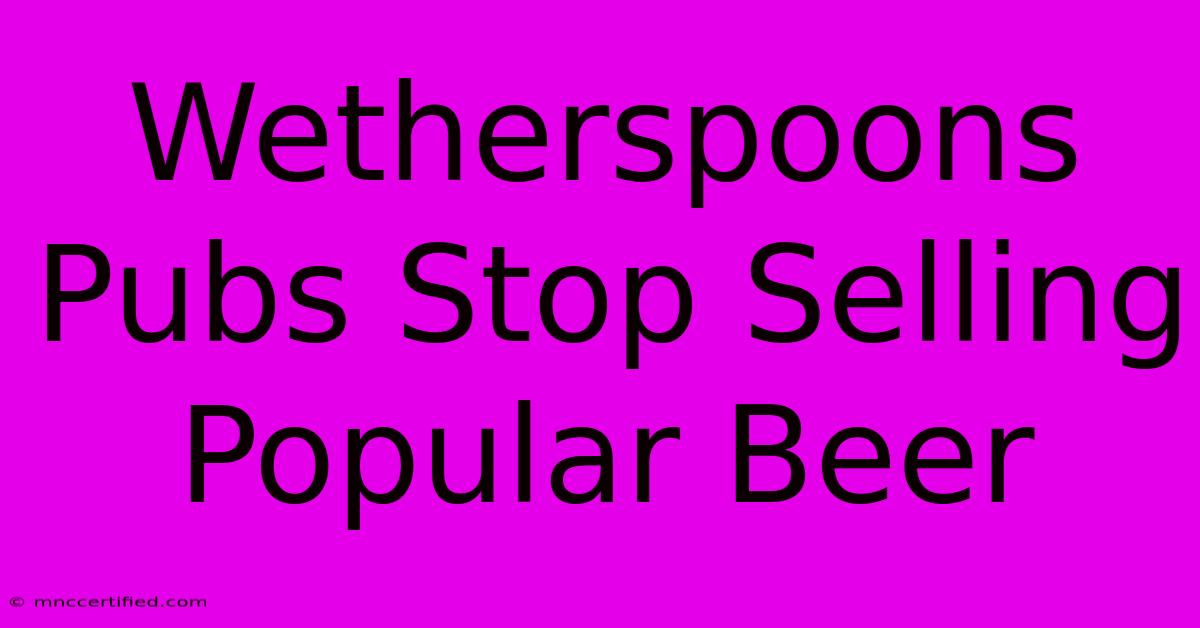Wetherspoons Pubs Stop Selling Popular Beer

Table of Contents
Wetherspoons Pubs Stop Selling Popular Beer: What's the Story?
The news that Wetherspoons pubs have stopped selling a popular beer has sent ripples across the UK. This move has sparked curiosity and questions from customers, raising eyebrows about the reasons behind this decision and its potential impact. In this article, we'll delve into the details of this change, exploring the possible factors behind it and its implications for both Wetherspoons and beer lovers.
Which Beer Is Out of Stock?
The popular beer in question is Carling, a well-known and widely enjoyed lager brand. The decision to stop selling it has left many customers wondering what happened and whether it's just a temporary shortage or a permanent change.
Why Has Carling Disappeared from Wetherspoons?
While Wetherspoons has not officially confirmed the specific reasons behind the decision, several factors are likely at play.
1. Supply Chain Issues: The ongoing global supply chain disruptions, exacerbated by the pandemic and the war in Ukraine, have impacted various industries, including the beer sector. It's possible that Wetherspoons is facing challenges in securing a steady supply of Carling.
2. Cost Increases: The cost of raw materials, packaging, and transportation has significantly risen in recent times. Wetherspoons, known for its value-for-money offerings, might be adjusting its beer selection to accommodate these increased costs, potentially opting for cheaper alternatives.
3. Changing Customer Preferences: Wetherspoons is constantly adapting to evolving consumer tastes. It's possible that the chain is responding to a shift in consumer preferences towards craft beers, imported lagers, or other popular alternatives.
4. Contractual Changes: Wetherspoons might have experienced a change in its contractual agreements with Carling, leading to the removal of the beer from its pubs.
What Does This Mean for Wetherspoons?
The removal of Carling from Wetherspoons' menu could have both positive and negative implications for the chain.
Potential Benefits:
- Reduced Costs: Switching to cheaper beer options could help Wetherspoons manage its expenses and maintain its competitive pricing strategy.
- Enhanced Menu Variety: Offering a wider range of beers, including craft brews and other popular options, could attract a more diverse customer base.
Potential Drawbacks:
- Customer Dissatisfaction: Some customers may be unhappy with the absence of their preferred beer, potentially leading to decreased footfall.
- Negative Publicity: The decision could generate negative media attention and damage Wetherspoons' image among beer enthusiasts.
What About Customers?
For Carling fans, the news is undoubtedly disappointing. However, Wetherspoons still offers a diverse selection of beers, providing ample alternatives to choose from. This change could be an opportunity to try new brews and discover hidden gems.
Conclusion
The disappearance of Carling from Wetherspoons pubs is a notable development that raises questions about the future of the pub chain's beer selection. While the exact reasons behind this decision remain unconfirmed, supply chain issues, cost pressures, and evolving consumer preferences are likely factors. It remains to be seen whether this is a permanent change or a temporary measure. As always, the best course of action is to stay informed and enjoy the variety of beer options still available at Wetherspoons pubs.

Thank you for visiting our website wich cover about Wetherspoons Pubs Stop Selling Popular Beer. We hope the information provided has been useful to you. Feel free to contact us if you have any questions or need further assistance. See you next time and dont miss to bookmark.
Featured Posts
-
Customer Journey Insurance Industry
Nov 13, 2024
-
Dublin Concert Pitbull And Lil Jon February 2025
Nov 13, 2024
-
Pope Gets First Win As Kentucky Tops Duke
Nov 13, 2024
-
Raptors Visit Bucks Fiserv Forum Action
Nov 13, 2024
-
Video Shows Explosion At Clifton Business
Nov 13, 2024